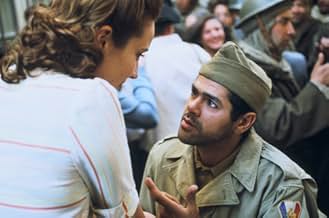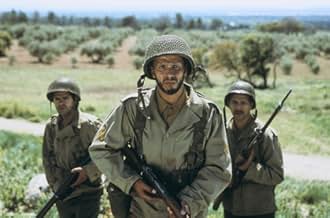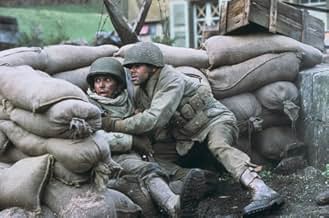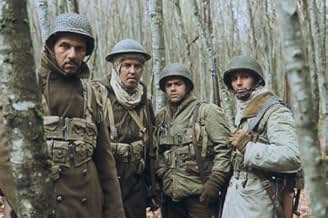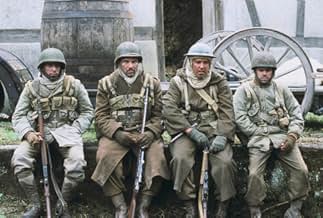Indigènes
- 2006
- Tous publics
- 2h 8min
NOTE IMDb
7,0/10
15 k
MA NOTE
Pendant la Seconde Guerre mondiale, quatre hommes d'origine nord-africaine s'enrôlent dans l'armée française pour libérer ce pays de l'oppression nazie, et pour lutter contre la discriminati... Tout lirePendant la Seconde Guerre mondiale, quatre hommes d'origine nord-africaine s'enrôlent dans l'armée française pour libérer ce pays de l'oppression nazie, et pour lutter contre la discrimination française.Pendant la Seconde Guerre mondiale, quatre hommes d'origine nord-africaine s'enrôlent dans l'armée française pour libérer ce pays de l'oppression nazie, et pour lutter contre la discrimination française.
- Réalisation
- Scénario
- Casting principal
- Nommé pour 1 Oscar
- 9 victoires et 17 nominations au total
Avis à la une
Days of Glory (Indigénes) can boast that it was the most important if not the most successful of the five films in the Oscars' Best Foreign Film category. After French Premier Jacques Chirac saw the film, he agreed to compensate all North Africans who fought in World War II by unfreezing their pensions, a result the director Rachid Bouchareb worked hard to achieve. Though conventional in its technique and lacking in any real character development, Days of Glory, a French Moroccan Algerian co-production, is an involving and heartfelt film whose outstanding ensemble cast won the award for Best Actor at the 2006 Cannes Film Festival.
The film depicts a group of North African volunteers who enlist in the French army to support the French resistance against the Nazis during World War II. The fact that they are fighting for a lesser group of colonial oppressors against a more virile one does not enter their mind and they are ecstatic with the thrill of being on French soil for the first time. Their shabby treatment, however, by bigots in the French army who deny them the privileges that they take for granted becomes the centerpiece of the film. Unlike the French, the North African recruits are not granted leave to visit their families, are not promoted, and are not even allowed tomatoes with their dinner.
The film opens in 1943 as the enlisted men say goodbye to their families in Algeria, Morocco, and Senegal to join the fight against the Germans. Bouchareb follows four men: Said (James Debbouze), a young Algerian is moved to enlist by a recruiter's sloganeering and his own desire to escape his economic hardship; Yassir (Samy Naceri) who joins in Morocco even though he cannot help being bitter toward the French government that killed his family in the name of pacification.
We later meet Messaoud (Roschdy Zem), a solid marksman who falls for a young French woman but their correspondence is intercepted and censored by the French and his "no luck" tattoo on his neck turns out to be prophetic. The strongest character in the film is Abdelkader (Sami Bouajila), whose outspokenness against the injustice shown to North African soldiers keeps him from being promoted but earns him a strong following. Said develops a close relationship with Sergeant Martinez (Bernard Blancan), a by the book Captain who nonetheless speaks up for the dedication of his men but when Said happens to suggest that Martinez is part Arab, their relationship ends swiftly and dramatically.
The high point of the film is the battle for a village in Alsace. It is a tense, emotionally harrowing sequence that is the equal of anything in Saving Private Ryan. Days of Glory has a strong point of view but is not didactic. It simply lets us see the face of discrimination against Arab soldiers during the war and the tension that arose in the French army because of it, a harbinger of colonial wars and urban tensions to follow. While the film unfortunately ends on a clichéd note, it is still quite moving and makes sure the brave soldiers from North Africa are acknowledged for their contribution, sadly overlooked these many years.
The film depicts a group of North African volunteers who enlist in the French army to support the French resistance against the Nazis during World War II. The fact that they are fighting for a lesser group of colonial oppressors against a more virile one does not enter their mind and they are ecstatic with the thrill of being on French soil for the first time. Their shabby treatment, however, by bigots in the French army who deny them the privileges that they take for granted becomes the centerpiece of the film. Unlike the French, the North African recruits are not granted leave to visit their families, are not promoted, and are not even allowed tomatoes with their dinner.
The film opens in 1943 as the enlisted men say goodbye to their families in Algeria, Morocco, and Senegal to join the fight against the Germans. Bouchareb follows four men: Said (James Debbouze), a young Algerian is moved to enlist by a recruiter's sloganeering and his own desire to escape his economic hardship; Yassir (Samy Naceri) who joins in Morocco even though he cannot help being bitter toward the French government that killed his family in the name of pacification.
We later meet Messaoud (Roschdy Zem), a solid marksman who falls for a young French woman but their correspondence is intercepted and censored by the French and his "no luck" tattoo on his neck turns out to be prophetic. The strongest character in the film is Abdelkader (Sami Bouajila), whose outspokenness against the injustice shown to North African soldiers keeps him from being promoted but earns him a strong following. Said develops a close relationship with Sergeant Martinez (Bernard Blancan), a by the book Captain who nonetheless speaks up for the dedication of his men but when Said happens to suggest that Martinez is part Arab, their relationship ends swiftly and dramatically.
The high point of the film is the battle for a village in Alsace. It is a tense, emotionally harrowing sequence that is the equal of anything in Saving Private Ryan. Days of Glory has a strong point of view but is not didactic. It simply lets us see the face of discrimination against Arab soldiers during the war and the tension that arose in the French army because of it, a harbinger of colonial wars and urban tensions to follow. While the film unfortunately ends on a clichéd note, it is still quite moving and makes sure the brave soldiers from North Africa are acknowledged for their contribution, sadly overlooked these many years.
I was happy to see this film. After all, practically every WWII film about the war in Europe focuses on the soldiers from the major combatants--Americans, Brits, Germans or the French. However, this one is about men from the French colony of Algeria--folks you seldom ever hear about and I am sure many people from my country had no idea these folks fought for the Allies. In fact, now that I think about it, the only film where I can remember North African troops was "Two Women" and the Moroccan soldiers who raped the two ladies in the film! So, fortunately, these brave men get their due in "Days of Glory".
"Days of Glory" focuses on four men in particular. These four volunteered to free their mother country in 1943. However, they soon saw that they weren't quite regular soldiers. Instead of receiving accolades or rank for their efforts, the men noticed that the white Christian French soldiers received these honors and the job of these Algerians was to shut up and die. Other examples of prejudice against these men were shown throughout the film as well as many incidents where they proved themselves in action.
While I am thrilled that the men in this film finally get their due, I only give the film a 7. This means the film is good and worth seeing, but it had room for improvement. My problem with the film is that despite being a heart-moving topic, the film, strangely, was a bit bland. Much of this is because you never really felt that you learned who these men were since the film felt quite episodic. I wanted to see more humanity and individual stories. Still, it's quite a good film despite this.
"Days of Glory" focuses on four men in particular. These four volunteered to free their mother country in 1943. However, they soon saw that they weren't quite regular soldiers. Instead of receiving accolades or rank for their efforts, the men noticed that the white Christian French soldiers received these honors and the job of these Algerians was to shut up and die. Other examples of prejudice against these men were shown throughout the film as well as many incidents where they proved themselves in action.
While I am thrilled that the men in this film finally get their due, I only give the film a 7. This means the film is good and worth seeing, but it had room for improvement. My problem with the film is that despite being a heart-moving topic, the film, strangely, was a bit bland. Much of this is because you never really felt that you learned who these men were since the film felt quite episodic. I wanted to see more humanity and individual stories. Still, it's quite a good film despite this.
The movie takes the viewer on a trip back to the second world war, showing how parts of the Arabic population fought with the French colonists for their freedom, against Nazi Germany trying to occupy Africa. As the movie evolves, other aspects than the fight for freedom and the brutality of war emerges. The viewer is reminded that the the social identity of the white bourgeoisie class and the stereotypes that follows not emerged with the current world of terrorism. Questions of power, humanity, religion, racism, love and honour follows the viewer through this exciting, emotional and realistic movie. Along with the plot and acting in this piece of work, the critical viewer should be satisfied.
I did not know what to expect from this movie starring guys like Djamel Debbouzze or Samy Naceri, more used to non sense jokes and wrong way taxi driving, but I must say I was astonished.
First pictures are beautiful, dialogs and pace slow but efficient.
Second the way the four main characters perform is great (although Naceri is maybe not quite as good as the three others). All moved by different motivations, they have a sole dream: to be a real part of it, a part of the French country they have been fighting for. And they make you believe it. Not only because they fit perfectly into their roles, but also because the suffering and the inequalities they undergo in the war fields of the movie still exist six decades after in their every day life.
"All animals are equal, but some are more equal than others". True it was in Provence or in Alsace, true it is in today's France.
To me this film is more than the French Private Ryan, it is a subtle way to ask: "how much more is it going to take before we can all be on the same boat ?" Go and see it.
First pictures are beautiful, dialogs and pace slow but efficient.
Second the way the four main characters perform is great (although Naceri is maybe not quite as good as the three others). All moved by different motivations, they have a sole dream: to be a real part of it, a part of the French country they have been fighting for. And they make you believe it. Not only because they fit perfectly into their roles, but also because the suffering and the inequalities they undergo in the war fields of the movie still exist six decades after in their every day life.
"All animals are equal, but some are more equal than others". True it was in Provence or in Alsace, true it is in today's France.
To me this film is more than the French Private Ryan, it is a subtle way to ask: "how much more is it going to take before we can all be on the same boat ?" Go and see it.
It's 1943 Algeria. Muslims are recruited to fight for France. They go to Morocco to train and then arrive in Italy in 1944 to fight with the Allies. Saïd Otmari is poor illiterate mountain goat herder. Messaoud Souni is well spoken and falls for a French woman. Sergeant Martinez is a hardened leader willing to send the green recruits into suicidal charges but he hides his personal Arab connections. The men face racism in many blatant ways and Abdelkader gives voice to getting more equality.
This is an interesting part of the war that has been white-washed. The movie does struggle with a simple message as the men themselves have infighting about the war and their cause. Some of them fight for the money while others bought into the slogans. There is some good action and a solid final battle.
This is an interesting part of the war that has been white-washed. The movie does struggle with a simple message as the men themselves have infighting about the war and their cause. Some of them fight for the money while others bought into the slogans. There is some good action and a solid final battle.
Le saviez-vous
- AnecdotesThe main actors, all of North African descent, did not know of France's discrimination towards foreign soldiers serving in the French army during World War 2 until filming began.
- GaffesIn the scene when the African soldiers raise the French tricolor over the Italian mountain top, the flag they use is polyester (i.e. a contemporary flag). World War II troops would have used a cotton flag.
- ConnexionsFeatured in Indigenes: Le making of (2006)
- Bandes originalesLe lac des cygnes
Composed by Pyotr Ilyich Tchaikovsky
Meilleurs choix
Connectez-vous pour évaluer et suivre la liste de favoris afin de recevoir des recommandations personnalisées
- How long is Days of Glory?Alimenté par Alexa
Détails
Box-office
- Budget
- 14 500 000 € (estimé)
- Montant brut aux États-Unis et au Canada
- 320 700 $US
- Week-end de sortie aux États-Unis et au Canada
- 10 996 $US
- 10 déc. 2006
- Montant brut mondial
- 22 963 701 $US
- Durée
- 2h 8min(128 min)
- Couleur
- Mixage
- Rapport de forme
- 2.35 : 1
Contribuer à cette page
Suggérer une modification ou ajouter du contenu manquant


